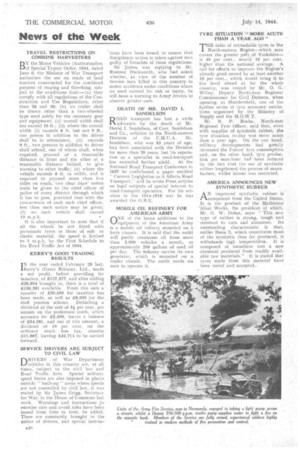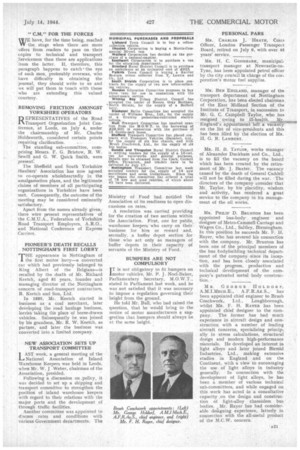News of the Week
Page 22

Page 23

If you've noticed an error in this article please click here to report it so we can fix it.
TRAVEL RESTRICTIONS ON COMBINE HARVESTERS
BY the Motor Vehicles (Authorization of Special Types) Order, 1944, dated June 6, the Minister of War Transport authorizes the use on roads of land tractors constructed for the combined purpose of reaping and threshing, subject to the conditions that:—(a) they comply with all regulations of the Construction and Use Regulations: other than 28 and 29; (h) no trailer shall be drawn other than a two-wheeled type used solely for the necessary gear and equipment; (c) overall width shall not exceed 10 ft.; (d) where the overall width (i) exceeds 8 ft. but not 9 ft., one person in addition to the driver shall be in attendance. (ii) exceeds
ft., two persani in addition to driver shall attend, one of whom shall, when required, proceed at a reasonable distance in front and' the other at a reasonable distance behind, to give warning to other traffic; (e) where the vehicle exceeds 8 ft. in width, and is required to proceed more than five miles on roads, two clear days' notice tritAt be given to the chief officer of police of every district through which it has to pass, provided that with the concurrence of each such chief officer, less than such notice may be given; (f) no such vehicle shall exceed 10 It is also important to note that if all the wheels be not fitted with pneumatic tyres or those of soft or elastic material, the speed is limited to 5 m.p.h. by the First Schedule to the Road Traffic Act of 1934.
KERRY'S GOOD TRADING RESULTS ' IN the year ended February 29 last, Kerry's (Great Britain.), Ltd., made a net profit, before providing for taxation, of £127,577, and after adding £28,804 brought in, there is a total of £156,381 available. From this sum a transfer of £90,500 for taxation has been made, as well as £6,000 for the staff pension scheme. Deducting a dividend at the rate of S per cent, per annum on the preference stock, which accounts for £5,500, leaves a balance of £54,381, and out of this amount, a dividend of 10 per cent, on the ordinary stock less tax, absorbs 211,667, leaving £42,714 to be carried forward.
SERVICE DRIVERS ARE SUBJECT TO CIVIL LAW
DRIVERS of War Department L./vehicles in this country are, at all times: subject to the civil law and Road Traffic Acts. Special military speed limits are also imposed in places outside " built-up " areas where speeds are not controlled by civil law, it was stated by Sir James Grigg, Secretary for War, in the House of Commons last week. Warnings and instructions to exercise cre and avoid risks have been issued from time to time, he added. These are constantly brought to the notice of drivers, and special instruc
tions have been issued to ensure that disciplinary action is taken against men guilty of breaches of these regulations.
Sir James was replying to Mr. Rostron Duckworth, who had asked whether, fn view of the number of Service men killed in this country in motor accidents under Conditions where no need existed for risk or hurry, he will issue a warning to Army drivers to observe greater care.
DEATH OF MR. DAVID I.. SANDELSON
ROAD transport has lost a virile advocate by the death of Mr. David I. Sandelson, of Carr, Sandelson and Co., solicitor to the North-eastern Division of the C.M.U.A. Mr. Sandelson, who was 53 years of age, had been associated with the Division for more than 20 years, but his reputation as a specialist n road-transport law extended farther afield. At the National Road Transport Conference in 1937 he contributed a paper entitled " Current Legislation as it Affects Road Transport." and he wrote Press articles on legal. subjects of special interest to road-transport operators. For his services in the 1914-1918 war he was awarded the O.B.E.
MOBILE OIL REFINERY FOR AMERICAN ARMY
("NE of the latest additions to the \-/Cquipment of the American Army is a mobile oil refinery Mounted on a lorry chassis. It is said that the outfit will purify crankcase oil from more than 3,000 vehicles a month, or approximately 200 gallonsof used oil per day. The tefinery carries its own generator, which is mounted on a trailer chassis. The outfit needs six men to operate it.
TYRE SITUATION "MORE ACUTE .• THAN A YEAR AGO"
THE ratio of retreadable tyres in the North-eastern Region—which area covers the greater patt .of Yorkshire— is 40 per cent., nearly 10 per cent, higher than the national average. A call for efforts to improve the Region's already good record by at. least another 10 per cent., which would bring it .to the level aimed at for the whole country, was voiced by Mr. 0. G. Willey, Deputy North-east Regional Commissioner for Civil 'Defence, when opening, at Huddersfield, one of the further series of tyre economy exhibitions organized by the Ministry of Supply and the M.O.W.T.
Mr. R. P. Roche, Northeast Regional Tyre Officer, said that, even with supplies of synthetic rubber, the tyre situation to-day was more acute than a year ago. On. the one hand, military -developments had greatly increased the Forces tyre consumption and, on the other hand, tyre production per man-hour had ,been reduced by the fact that the use of synthetic rubber lengthened the process of .manitfacture, whilst labour was restricted.
AMERICA ANNOUNCES New SYNTHETIC RUBBER improved synthetic rubber, is
announced from the United States. It is the product of the Mathieson 'Alkai Works, the president of which, Mr. G. W. Dolan, says: " This new type of rubber strong, tough and resistant to cuts and abrasions. Its outstanding characteristic is that, .unlike Buna S, which constitutes most of the synthetic thus far produced, it withstands high temperattires. It is composed of butadiene and a new chemical produced from readily available raw materials." It is stated that tyres made from this material have been tested and accepted.
"CM." FOR THE FORCES WE have, for the time being, reached IN the stage when there are more offers from readers to pass on their copies to technical and transport Servicemen than there are applications from the latter. If, therefore, this paragraph happens to catch • the eye of such men, preferably overseas, who have difficulty in obtaining the journal, they should write to us and we will put them in touch with those who are extending this valued courtesy.
REMOVING FRICTION AMONGST YORKSHIRE OPERATORS
D EPRESENTATIVES of the Road llTransport Organization Joint Conference, at Leeds, on July 4, under the chairmanship of Mr. Charles Holdsworth, considered certain points requiring clarification.
The standing sub-committee, comprising Messrs. F. C. Bristow, R. W. Sewill and G. W. Quick Smith, were present:
The Sheffield and South Yorkshire Hauliers' Association has now agreed to co-operate wholeheartedly in the amalgamation plans, and the legitimate claims of members of all participating organizations in Yorkshire have been met. Consequently, the ontcotne of the meeting may be considered eminently satisfactory.
Apart from the names already given, there were present representatives of the C.M.U.A.. Federation of Yorkshire Road Transport Employers, A.R,O., and National Conference of Express Carriers.
• PIONEER'S DEATH RECALLS • NOTTINGHAM'S FIRST LORRY
Tappearance in Nottingham of the first motor lorry—a converted car which had previously belonged to King Albert of the Belgians—is recalled by the death of Mr. Richard Keetch, aged 81 years, founder and managing director of the Nottingham concern of road-transport contractors, R. Keetch and Son, Ltd.
In 1880, Mr. Keetch started in business as a coal merchant, later developing the road haulage business, lorries taking the place of horse-drawn vehicles.. Subsequently he was joined by his grandson, Mr. R. W. Keetch, as partner, and later the business was converted into a limited company.
NEW ASSOCIATION SETS UP TRANSPORT COMMITTEE
LAST week, a general meeting of the National Association of Inland Warehouse Keepers was held in Leeds, when Mr. W. J Metier, chairman of the Association, presided.
Following a discussion on ..policy, it was decided to set up a shipping and transport committee to strengthen the position of inland warehouse keepers with regard to their relations with the major ports and the development of through traffic facilities.
Another committee was appointed to discuss rates and conditions with various Government departments. The Ministry of Food had notified the Association of its readiness to open discussions on rates.
A resolution was carried providing for the creation of two sections within the Association. First, one for public_ warehouse keepers who carry on their business for hire or reward and, secondly, a buffer depot section for those who act only as managers of butler depots in their capacity a servants of the Ministry of Food.
BUMPERS ARE NOT COMPULSORY
IT is not obligatory to fit bumpers on motor vehicles, Mr. P. J.. Noel-Baker, Parliamentary Secretary, M.O.NAT.T., stated in Parliament last week, and he was not satisfied that it was necessary to impose a regulation governing their height from the ground.
He told Mr. Bull, who had raised the question, that he would bring to the notice of motor manufacturers a sug-gestion that bumpers should always be at the same height. MR. CHARLES J.HEATH, COSte. Officer, London Passenger Transport Board, retired on July 9, with over 45 years' service.
MR. H. C. GODSMARK, municipaltransport manager at Newcastle-onTyne, has been appointed petrol officer by the city council in charge of the corporation's motor fuel supplies.
MR. BEN ENGLAND, manager of the transport department of Nottingham Corporation, has been •elected'chairman of the East Midland Section of the Institute of Transport, in succession to Mr, G. C. Campbell Taylor, who has resigned ..wing to. ill-health. England's appointment left' a vacancy on the list of vice-presidents and this has been filled b,r the 'election of MR. H. G. R. LAMBERT,
MR. H. B. TAYLOR, works manager of Alexander Duckham and Co., Ltd., is to fill the vacancy on the board which has been created by the retirement of Mr. J. Baxter. The vacancy caused by the death of General Caddell will not be filled during the war. • The directors of the company consider that Mr. Taylor, by his placidity, wisdom and activity, has rendered a great service to the company in his management of the oil works.
MR, PHILIP" D. BRUNTON has been appointed bus-body engineer and designer of Metro-CammeIrCarriage and Wagon Co., Ltd., Saltley, Birmingham. In this position he succeeds Mr. F. H. Rayer, who has severed his connection with the company. Mr. Branton has been one of the principal members of the bus bodybuilding technical department of the company since its inception, and has been closely associated with the progress, production and technical development of the company's patented metal body construction.
MR. GEORGEHOLDORF,
A.M.I.MECIi.E., A.F.R.AE.S.,' has been appointed chief engineer to Brush Coachwork,. Ltd Loughborough, whilst MR. F. H. 'RAVER has been appointed chief designer to the company. The former has had .much experience in aircraft design and cons struction with a number of leading aircraft concerns, specializing princip-, ally in stress calculations, . structural design and modern high-performance Materials. He developed an interest in light alloys and later joined Birmid Industries, Ltd., making extensive studies in England and on the Continent, with a yiew to encouraging the use of light alloys in industry generally. In connection with the development of. light alloys, be has been a member of various technical sub-committees, and while engaged on . this work has acted in a consultative capacity ,on the design and construction of light-alloy chassisIess bus bodies. Mr. Rayer has had considerable designing experience, latterly in connection with the all-metal product
of the concern.




















































